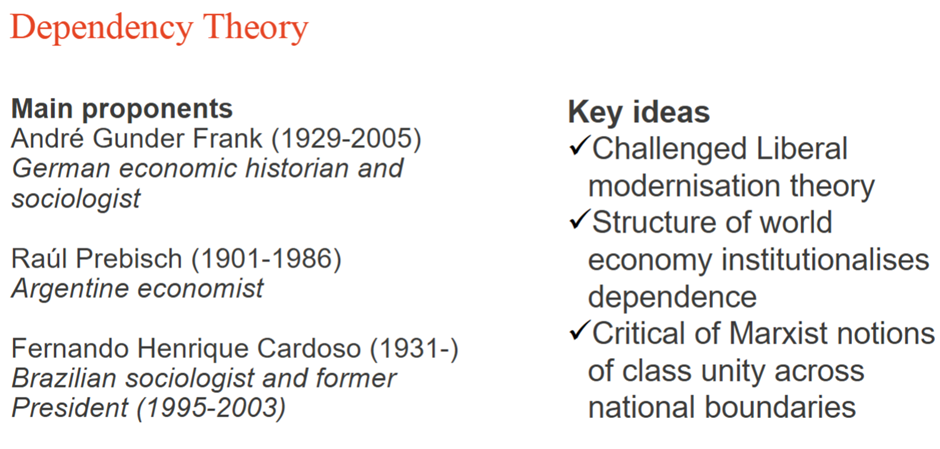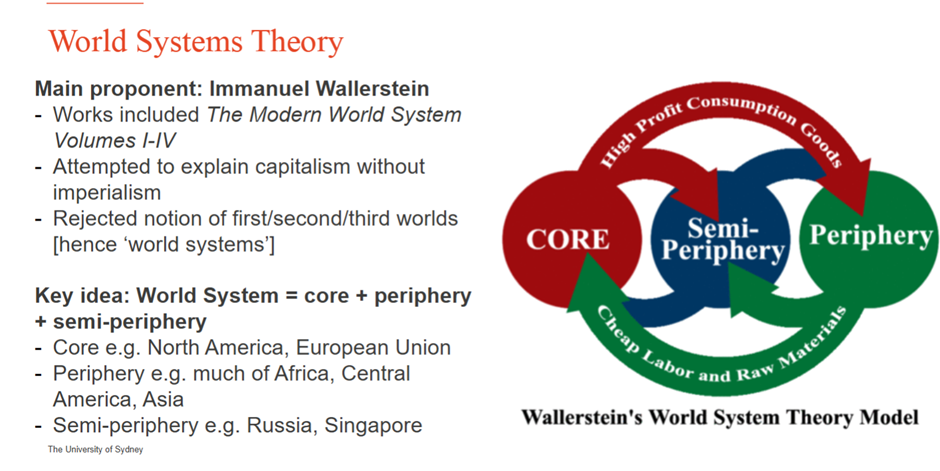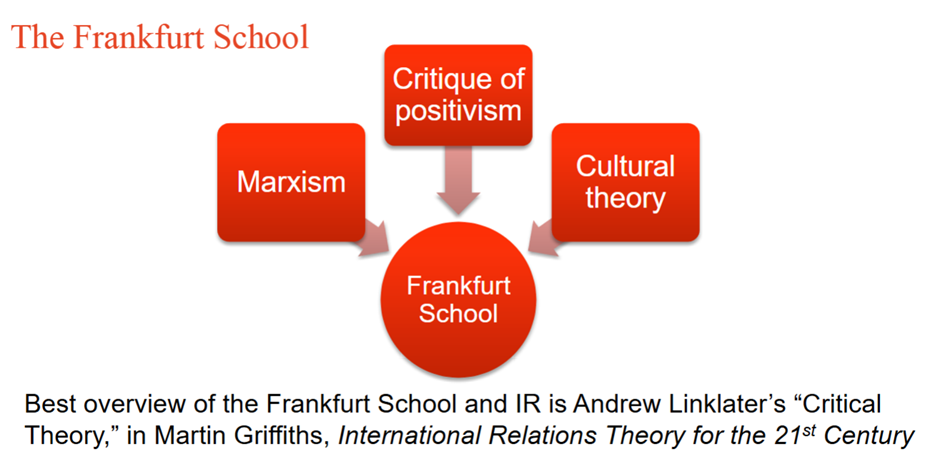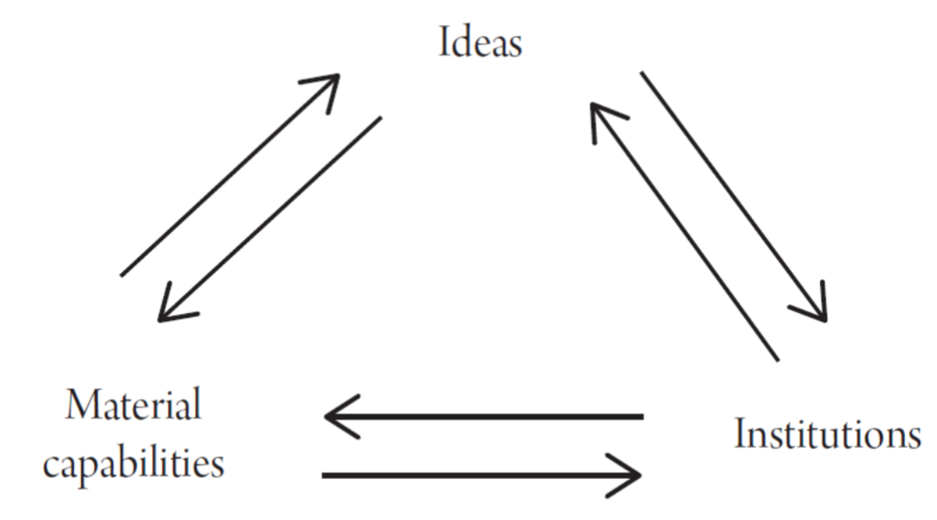week nine: marxism and critical theories of IR
1/33
There's no tags or description
Looks like no tags are added yet.
Name | Mastery | Learn | Test | Matching | Spaced |
|---|
No study sessions yet.
34 Terms
What are some key thoughts of Marx?
emphasises the negative consequences of industrialised capitalism without completely dismissing its latent potential for an emancipated, postcapitalist society
critique of capitalism is focused on the unequal, exploitative social relations of capitalism rather than industrialised productive forces of modernity
insists a small, wealthy minority - owners and controllers of the means of production - exploit their class power in their domination of the great powers
it understands liberalism as not a neutral or objective theory, but as the ideology of capitalism and ruling class power - designed therefore to legitimate and conceal the true nature of capitalisms relations of domination, exploitation and alienation.
What are the key features of Marx’s theoretical framework
recognition of industrial modernity’s emancipatory potential
critique of capitalism for generating unequal social relations which led to domination, exploitation and oppression
explanation of class conflict as an outgrowth of power struggles between those who own and control the means of control (bourgeoise) and those who don’t (proletariat)
Critique of liberalism as an ideology that legitimises capitalism.
Exploration of potential sources of progressive social change.
What is historical materialism?
The approach to radical emancipation that identified class conflict and political struggle as the driving forces of history.
How do marxists view history?
History is understood as a progressive unfolding of better and increasingly rational social arrangements in which people could look forward to more fulfilled, freer, and more ‘civilised’ lives than previous generations.
What were Marx’s thoughts on capitalism?
Capitalism was a crucial driving force in this progressivist narrative, because of its unparalleled capacity to rapidly change the lives and social aspirations of so many people across the industrialising world.
For Marx, the capitalist stage of progressive development and bourgeois ideology could not represent the apex of human achievement - it was too selfish and exploitative for this - and must be superseded by a higher form of productive and social life, initially of a socialist kind and at some time, a communist kind.
What is some integral theory of Marx’s historical materialism?
the proposition that the everyday social and political practices of the material world that sparked the great ideas and passions for emancipatory change.
It was ‘the way in which men produce their means of subsistence’ that drives the desire for emancipation - a process that leads them into conflict with their class enemies.
What is the quote of marx about material and ideational bases of human conditions changing → politics acquires new forms?
‘as individuals express their life, so they are’. (humans are what they do, and how they conceive of and articulate what they do can change their lives and consciousness of life).
What is the organising principle of Marx’s revolutionary thinking?
Class struggle is the driving force of history, shaping and reshaping social relations and all the civil and political institutions that grow out of them - not least states, markets and the state system. Marx’s theory places class conflict and redefines modern politics as the class infused product of an increasingly globalised capitalism.
Marxist generally agree that the global expansion of the modern state, is inseparable from
the development of global capitalism
Marxist theorists of the state and IR including Wallerstein argue that the state system and world economy were inseparable from birth:
‘Capitalism and the modern state were not two separate historical inventions (or conceptions) that had to be fitted together or articulated… obverse sides of a single coin. Both part of a seamless whole’. (1996)
What do Rosenberg and Teschke discuss about changes in the modern state and state system?
They are a reflection of the changing ways in which societies organise their economic lives, especially the way in which property is conceptualised and distributed.
The particular form taken by the nation state at any moment in time is always an outward reflection of capitalisms’ inner logic as it interacts with ‘external’ geopolitical logics.
What does Frankfurt School Critical Theory question?
The impact on social life of positivist and scientific-rationalist modes of inquiry.
Proposes that post-enlightenment modernity had become colonised by a form of ‘instrumental’ (market or scientific) rationality interested in only ‘efficient’ means to ends while not evaluating the moral legitimacy of these ends of their social implications.
what does instrumental or technical mean in Marxism?
Achieving technical control over natural and social environments → positivist and empiricist, neorealism and neoliberalism
what does practical mean in marxist theory?
Achieving a framework of mutual understanding and coordination for social interaction (hermaneutic and interpretive) → classical realism, english school, constructivism
What is emancipatory in Marxist theory?
Achieving freedom and autonomy from various forms of domination and exclusion (self-reflective) → Marxism, feminism, critical theory, post-modernism
What is the ‘legitimation crisis’ in liberal-capitalist societies? According to Habermas?
Bureacratic logics of the state and the market logics of capitalism hollow out society and subordinate the cultural and moral lives of individuals and communities (Habermas 1976).
There is an absence of an ‘emancipatory’ interest in changing the system in favour of a freer and more democratic political order.
What did Robert Cox say problem solving theory?
Its based on positivist methods and oriented to maintaining the prevailing structures of social power, or at least working within the constraints of the present system to smooth over any problems or crisis. It takes the world as it finds it, with the prevailing social and power relationships and the institutions into which it is organised, as the given framework of action’
According to Robert Cox, what is critical theory?
It is based on historical materialism that seeks more radical transformation which will enhance the global conditions for freedom and democracy. It does not take the prevailing order of social and power relationships and institutions as the given framework, but asks how the order came about, and whether it might be in the process of changing.
What is Cox’s statement about theory?
‘Theory is always for someone and for some purpose’.
All theory derives from a perspective and is embedded in social relations that characterise the political and ideological order at any given time and cannot claim to be ‘divorced from a standpoint in time and space’
What does Gramsci say about hegemony?
It reconceptualises the modern state as a distinctive mode of class rule achieved through active consent of the masses who (via educational and formative processes of a class-based society) come to support the ideas, institutions and social structures that maintain the power and privelage of those who rule them (Davidson 2005).
What does Gramsci argue about the intellectual and structural principles of the ruling class?
They become ‘common sense’ for the great majority of people who seek to live by its rules and norms rather than critically confront or change it. Essentially, he focuses more on the superstructure, and how it forms the capitalist state and basis of a counter-hegemonic theory and practice in the interest of genuine intellectual and political democracy.
According to the Gramscians, the hegemonic ‘common sense’ that is no longer as compelling as it once was 0> neoliberal globalisation and the widening gap between winners, losers has led to
‘organic crisis’ for neoliberal capitalism, for US hegemony and for liberal-international order more broadly.
According to Gramscians, what has the consequences of the US ‘market civilisation agenda’ hegemony (the plan to consolidate power and prosperity of major states, corporations and small wealthy sectors of the globalised state)?
Rapid and extraordinary recalibration of post-WWII life and often dramatic challenges to established political norms and sites of authority. Great masses of people have ‘stopped believing in the reigning common sense that underpinned political domination for the last several decades’. (Fraser 2019).
Consider rise of populist, ‘anti-establishment parties’, Brexit,
These are the ‘morbid symptoms’ of a hegemonic system in deep crisis.
According to Gramsci, why is neoliberal hegemonic project been damaged?
Inability to reward its major support base economically,
the key to hegemonic power is the consent of the ruled to be ruled → perception those in subordianate classes are also having their wishes served. Effective in TINA, but not the failure of ‘trickle-down wealth’.
New kind of conflict, need collective class consciousness to combat (xenophobia, etc)
What is Cox’s alternative critical theory of IR that seeks to understand the historic and social structures shaping global politics. These are:
Theory is always for someone and for some purpose—it is never neutral.
The state, social forces, and world orders are interlinked and historically contingent.
Rather than seeing the state as a fixed unit, he examines how social forces (like classes, production modes, and ideologies) shape and are shaped by state structures.
World orders emerge from specific configurations of social forces and state forms.
What are Cox’s key concepts in his theory?
Problem-solving vs. critical theory
Historicization of IR theory
Social forces and state forms
Hegemony and world order
Theory as politically situated
What are some key concepts in Marxism?
- Means of production, proletariat, alienation, commodification, base/superstructure
- Superstructure indoctrinates us – ideological indoctrination.
How does marxism function in IR theory?
- History of world is class relations
- Imperialism is progressive, if brutal
- Change must be revolutionary
- Close attention to empires and neo-imperial relations
- Strong critiques of liberal ideology.
Story of economic factors and individuals. States are mediating forces.
What is the dependency theory

What is the World Systems theory of Wallerstein?

- Rejects notions of first, second and third world countries
- The core and periphery are not separate but deeply interlinked
- The core represents elites, and is bigger in core societies, and can be all sorts of firms and businesses. They have a relationship with the core and periphery.
- A lot of the leaders of periphery nations are gaining kickbacks – a lot of oil out of Nigeria, set up pipelines to the third world which were not very well made
What is frankfurt school, according to Griffiths?

- Opposed to positivism, ideas you can make the social world into a science
- Lots of cultural theory
What is cultural theory within Frankfurt school
- What draws us into consumerism and a core part of modern desire
- Examination of cultural and ideological products that enhance and further entrench capitalism (as an economic production)
- Mass consumption and culture industries
- Integrated theory of socio-political life
What is the critique of positivism in the Frankfurt school?
- You must bring ideas of ethics and morals.
- “Deeply suspicious of the idea...[of] objectively valid forms of knowledge” Mark Rupert
- “Science cannot tell us what we should do and how we should live” (from Tolstoy)
- Emphasize moral-practical knowledge over technical-instrumental knowledge
According to Gramsci, what is the relationship between material capabilities, institutions, and ideas?
